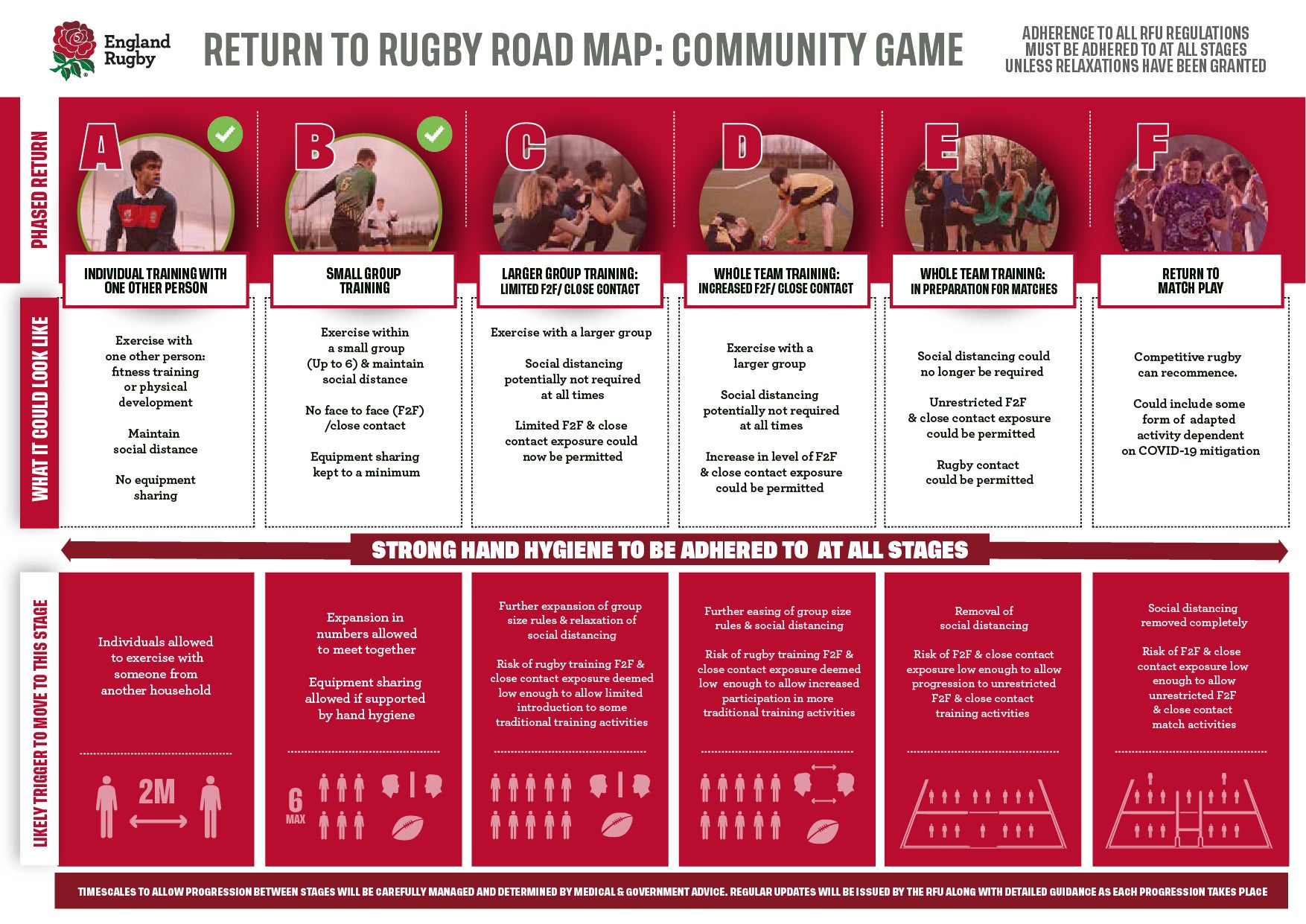RFU unveils Rugby Restart Road Map with three key dates identified for community clubs to return
A best-case, mid-term and worst-case scenario has been identified by the Rugby Football Union to resume the sport in England with a six-stage plan

Your support helps us to tell the story
From reproductive rights to climate change to Big Tech, The Independent is on the ground when the story is developing. Whether it's investigating the financials of Elon Musk's pro-Trump PAC or producing our latest documentary, 'The A Word', which shines a light on the American women fighting for reproductive rights, we know how important it is to parse out the facts from the messaging.
At such a critical moment in US history, we need reporters on the ground. Your donation allows us to keep sending journalists to speak to both sides of the story.
The Independent is trusted by Americans across the entire political spectrum. And unlike many other quality news outlets, we choose not to lock Americans out of our reporting and analysis with paywalls. We believe quality journalism should be available to everyone, paid for by those who can afford it.
Your support makes all the difference.The Rugby Football Union has unveiled a six-stage plan for community rugby to return to action, with the sport taking measures to ensure clubs across the country can resume competition in a coronavirus-safe environment with three possible restart dates pencilled in.
The Rugby Restart Road Map lays out the stages that will need to be met before matches at all levels of the community game can resume, with government advice dictating when the RFU can take the next step in their phased return guidelines.
The sport was brought to an abrupt halt in March due to the coronavirus pandemic, with the RFU taking the decision in April to end all league and cup competitions below the Premiership, which still aims to complete its 2019/20 season. For all other leagues, final positions were dictated utilising existing positions and a points per game formula based on home and away records to determine how the rest of the season would pan out, ensuring that promotion and relegation could be maintained.
However, while the 2019/20 season has concluded at all community levels, there remains serious uncertainty over when the 2020/21 campaign can get underway, with the situation regarding Covid-19 in England needing to allow all six stages of the RFU’s plan to be met before games will be permitted to take place.
Speaking on Thursday to announce the return-to-action plan, the RFU’s rugby development director Steve Grainger confirmed that three dates have been identified for the sport to resume, ranging from a best-case scenario to a pessimistic view that could see no further rugby played this calendar year.
Should the government give the green light, Grainger said, the hope is that the 2020/21 season can start as scheduled at the beginning of September, though should that not prove possible then a second launch period has been identified at the end of October and beginning of November.
But should the worst happen, such as a second coronavirus spike or the prolonging of social distancing restrictions, the RFU have also planned for the season to get underway in January next year, meaning a 10-month hiatus on the sport.
Following the government’s announcement that from last Monday gatherings of up to six people would be permitted in gardens and outside areas so long as the two-metre social distancing guidelines were adhered to, the RFU has said that they are already at stage two of their plan, meaning clubs can now return to training so long as players are restricted groups of six with no face-to-face contact and equipment sharing is contained to a minimum.
The six stages of the RFU’s Restart Road Map are:
- Stage one: Individual training with one person
- Stage two: Small group training
- Stage three: Larger group training: Limited face-to-face/close contact
- Stage four: Whole team training: Increased face-to-face/close contact
- Stage five: Whole team training: In preparation for matches
- Stage six: Return to match play

In announcing the plans, RFU chief executive Bill Sweeney confirmed that government advice will dictate when the restart road map can be progress.
“A great amount of work has been undertaken since rugby was suspended in March to align the various stages of social distancing announced by the government with our decision making focused on the best interests of players, volunteers and clubs,” Sweeney said.
“When considering the roadmap for a return to community rugby, we were aware that some clubs wanted to get back quicker than others as a major concern of clubs is to retain their players and preserve their revenue streams. We also recognise that other sports may return quicker in England and that rugby may return quicker in other countries. However, we will stay focused on what is right for rugby in England. Whilst we are keen to have rugby being played and members returning to their clubs, we need to be cautious and will therefore only move from one stage to another when guidance and advice says that it is safe to do so.
“There are many implications of a staged return to play, including the impact on the competitive programme, rugby activity in clubs, schools, colleges and universities and also the use of club houses and indoor facilities. We remain committed to addressing these challenges in the run up to the 20/21 season.”
Join our commenting forum
Join thought-provoking conversations, follow other Independent readers and see their replies
Comments